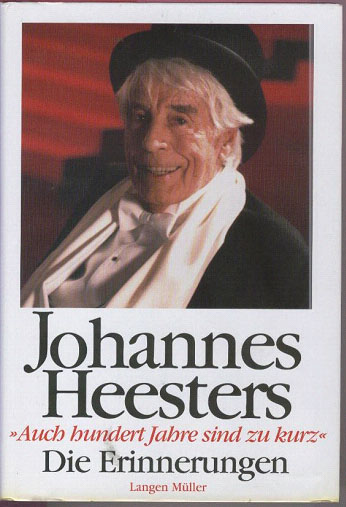
Heesters Johannes “Auch hundert Jahre sind zu kurz”
Die Erinnerungen
By Johan Heesters
Langen Muller 2002, 368 pp

Heesters was a famous “Spieltenor” of the thirties and fourties. He was a Dutchman who specialized in operetta and still followed the old traditions, even after Richard Tauber revolutionized everything by using an operatic voice. Up to Tauber most operetta tenors were good looking actors who could sing the role without much of a voice (as witnessed by the creators’ records). So it is no surprise that Heesters felt himself at ease in the spoken theatre or the non-musical movie. But Heesters has another distinction. He often was the Danilo and even the favourite Danilo of one who appreciated Die Lustige Witwe more than the Wagnerian humbug: Adolf Hitler. The problem with these “Erinnerungen” is plain. Of course Heesters has to take his distance from the Führer and several times he somewhat lamely explains that he couldn’t help the fact that Hitler liked him so much ( even overriding a ban of Goebbels because on a tour in the Netherlands Heesters had sung with Jewish colleagues). That is true but still one would like to ask the tenor by which law he as a Dutchman (he still is) had to make a career in Germany, being well aware of the regime. In these politically correct times it is probably impossible to tell the truth which is a pity as Heesters is the last of the popular pre-war artists in German. He could have given a historically correct story of the many reasons foreign artists went on to perform in Germany. Nor is his story very convincing concerning a visit to the concentration camp of Dachau. Heesters’ career didn’t sit well with his countrymen but this was nothing compared to the outcry when a Dutch weekly found the photographs of Heesters’ infamous visit. He tells us that he didn’t sing for the guards and that he was only there so that he and some colleagues could see for themselves how fine everything was (well possible; all those regimes create a few examplary cells for the visits of Red Cross or others. The Soviet Union specialized in it). After the war Heesters still acted in several movies before the genre petered out and he went to spoken theatre. Heesters was first married to the Flemish operetta diva Wieske Ghijs and he had three daughters with her. She died 22 years ago and a few years afterwards he remarried someone ….much younger, though we are not supposed to know how much younger (at least 50 years by my reckoning). A few years ago he once more became a well known name, by just being alive. He is an unbelievable 105 (as is Hugues Cuenod) and from time to time some muscle men put him in front of a camera and Heesters says or sings a few phrases.
Jan Neckers, Operanostalgia